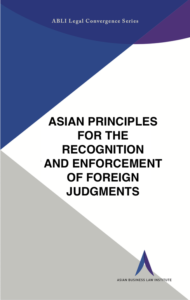In January 2018, we reported on the Recognition and Enforcement of Foreign Judgments in Asia, a publication by the Asian Business Law Institute (ABLI).
 The sequel to this publication, the Asian Principles for the Recognition and Enforcement of Foreign Judgments, will shortly be released by ABLI. This is a more ambitious piece of work which seeks to set out the principles which are common to the countries within the scope of the ABLI Foreign Judgments Project (namely the 10 ASEAN Member States and Australia, China, India, Japan and South Korea). There are 13 principles in total and each principle is accompanied by a commentary which fleshes out how the various countries apply each principle. Among other things, the principles cover the rules on international (or ‘indirect’) jurisdiction, reciprocity, the enforcement of non-money judgments, public policy, due process and inconsistent judgments. A detailed write-up on the project and principles can be found at Adeline Chong, ‘Moving towards harmonisation in the recognition and enforcement of foreign judgment rules in Asia’ (2020) 16 Journal of Private International Law 31-68 (https://doi.org/10.1080/17441048.2020.1744256).
The sequel to this publication, the Asian Principles for the Recognition and Enforcement of Foreign Judgments, will shortly be released by ABLI. This is a more ambitious piece of work which seeks to set out the principles which are common to the countries within the scope of the ABLI Foreign Judgments Project (namely the 10 ASEAN Member States and Australia, China, India, Japan and South Korea). There are 13 principles in total and each principle is accompanied by a commentary which fleshes out how the various countries apply each principle. Among other things, the principles cover the rules on international (or ‘indirect’) jurisdiction, reciprocity, the enforcement of non-money judgments, public policy, due process and inconsistent judgments. A detailed write-up on the project and principles can be found at Adeline Chong, ‘Moving towards harmonisation in the recognition and enforcement of foreign judgment rules in Asia’ (2020) 16 Journal of Private International Law 31-68 (https://doi.org/10.1080/17441048.2020.1744256).
ABLI has kindly offered to ‘soft-release’ the 13 principles which form the subject-matter of the 13 chapters of the Asian Principles to readers of conflictsoflaws.net. The 13 principles are set out below.
The Asian Principles will be released in eBook and hardcopy formats. Further details are available here.
Asian Principles for the Recognition and Enforcement of Foreign Judgments
Principle 1
As a general proposition and subject to these Principles, a foreign judgment in a commercial matter is entitled to recognition and enforcement.
Principle 2
A foreign judgment is eligible for recognition and enforcement if the court of origin has international jurisdiction to render that judgment.
The typical grounds on which a court is considered to have international jurisdiction include:
(a) where the judgment debtor was present, resident or domiciled in the country of the court of origin;
(b) where the judgment debtor, being a corporation, had its principal place of business in the country of the court of origin;
(c) where the judgment debtor submitted to the jurisdiction of the court of origin by invoking its jurisdiction or by arguing the merits of the case against it; and
(d) where the judgment debtor submitted to the jurisdiction of the court of origin by way of a choice of court agreement for the court of origin.
Principle 3
A foreign judgment is eligible for recognition and enforcement if it is final.
Principle 4
The court addressed must not review the merits of a foreign judgment, except to the extent necessary for the application of these Principles.
A foreign judgment may not normally be challenged on the ground that it contains an error of fact or law, or both.
Principle 5
A foreign judgment is eligible for recognition and enforcement if there is reciprocity between the country of the court addressed and the country of the court of origin.
Principle 6
Monetary judgments that are not for a sum payable in respect of a foreign penal, revenue or other public law are enforceable.
Principle 7
Non-monetary judgments that are not preliminary or provisional in nature may be enforced.
Principle 8
Recognition and enforcement of a foreign judgment may be refused if the judgment was obtained by fraud.
Principle 9
Recognition and enforcement of a foreign judgment may be refused if to do so would be manifestly incompatible with the public policy of the country of the court addressed.
Principle 10
Recognition and enforcement of a foreign judgment may be refused if there was a lack of due process in the proceedings before the court of origin.
Principle 11
Recognition and enforcement of a foreign judgment may be refused if it is inconsistent with a judgment in a dispute between the same parties that is given by the court addressed.
Recognition and enforcement of a foreign judgment may be refused if it is inconsistent with an earlier judgment given by a court of another country between the same parties and on the same subject matter, provided the earlier judgment fulfils the requirements for recognition.
Recognition and enforcement of a foreign judgment may be refused on the ground that proceedings between the same parties and on the same subject matter are pending before the court addressed if the court addressed was seized of the matter before the court of origin.
Principle 12
A foreign judgment that has as its object a right in rem in immovable or movable property is eligible for recognition and enforcement.
Principle 13
A foreign judgment that is objectionable in part may be severed and the unobjectionable part recognised and enforced.


